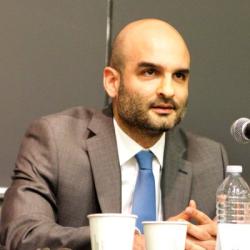

10:00 pm AST - 11:00 pm AST
Past Event
Content from the Brookings Doha Center is now archived. In September 2021, after 14 years of impactful partnership, Brookings and the Brookings Doha Center announced that they were ending their affiliation. The Brookings Doha Center is now the Middle East Council on Global Affairs, a separate public policy institution based in Qatar.
The Brookings Doha Center (BDC) hosted a webinar discussion on April 29, 2020 about the effects of the COVID-19 pandemic on migrant workers in the Gulf Cooperation Council (GCC). Panelists explained migrant workers’ response to the virus, how the present situation will impact future labor conditions, and the difficulties of reporting on the ground. The panel consisted of a group of distinguished scholars and experts, including: Zahra Babar, associate director for research at the Center for International and Regional Studies at Georgetown University in Qatar; Houtan Homayounpour, head of the International Labour Organization’s (ILO) Project Office in Qatar; and Borzou Daragahi, an international correspondent for The Independent.
Zahra Babar opened the discussion and explained the rationale behind migrant workers’ response to the pandemic. Prior to entering the GCC, migrant workers are subject to rigorous health tests to ensure that they do not possess an infectious disease. This is the first step in the job process and can foster anxiety among many who fear being denied entry. Babar notes that this medical system fails to prioritize migrant wellness and to provide treatment to those who are potentially ill. Migrant health is one small part of a larger labor regime, and so workers learn to treat their health not as a matter of personal importance but as a prerequisite for employment. That is why today, in the face of a pandemic, migrants seek to hide signs of illness for fear of being fired or deported. Babar contends that it is the medical screening process which has fostered such anxiety. Finally, she notes that governments should not release data about the virus’ spread along demographic lines. Doing so may cause the novel coronavirus to become associated with specific nationalities and thus lead to the stigmatization of such groups.
Houtan Homayounpour continued the discussion and spoke about legislation in Qatar. Given how quickly the virus has spread among the vulnerable population of migrant workers, the state has enacted legislative change to improve workers’ living spaces. However, it is not simply a matter of changing the legislation, but also of making sure that it is respected across the board. Currently, there are companies that fail to provide adequate accommodation, and the government is working to close illegal spaces. However, there are also workers, who, when given a living allowance, move into cramped accommodation to save money. Homayounpour states that the problem must be tackled from both ends, and migrant workers should be consulted in the process of legislative reform. He notes that the government is working to increase transparency to gain workers’ trust. If trust is established, then migrants will feel more comfortable coming forward with symptoms. Finally, Homayounpour noted that hotlines have been set up for workers to voice concerns. Civil society organizations have responded positively to this program; however, migrant workers remain hesitant to reach out.
Borzou Daragahi described the difficulties of reporting on migrant rights in the Gulf. Firstly, migrant workers are often hesitant to speak to the press. Many migrants come from disadvantaged backgrounds within their own communities and face further stigma in host countries. This fact, in conjunction with restrictions to free speech across the GCC, discourages individuals from sharing their stories. Daragahi then noted the challenge of accessing living and working spaces, stating that governments only show the labor camps or accommodation quarters that they are proud of. Although difficult to cover, stories about the lives of migrant workers often narrate profound journeys and are valued in the media community. Furthermore, Daragahi declared that while news outlets are dedicated to covering the pandemic and its implications for the Arab world, other topics have fallen by the wayside. The Libyan civil war is just one example. Finally, parts of the Middle East receive more coverage than others. A lack of transparency in the Gulf has meant less news stories about the region.
In the subsequent question and answer session, panelists discussed international bodies, progress made in Qatar, as well as external approaches to protect migrants during the coronavirus pandemic. Babar lamented the absence of a transnational framework that binds states and international bodies to ensure the health rights of migrants. More and more countries are increasingly reliant on temporary forms of labor, and so such a framework is necessary. Homayounpour stated that joint committees (bodies which allow for communication between migrant workers and management), are advancing in Qatar. The ILO will soon publish a report with the Ministry of Labor on the efficacy of such bodies during crises. Finally, Daragahi described the way Turkey is managing its migrant population amid the pandemic, to provide a potential model of action. He stated that international organizations are providing resources to local volunteers and de facto organizations to continue operations already set up in refugee camps.



Nicol Turner Lee, Dominique Duval-Diop
April 22, 2024

Matias Spektor
April 15, 2024

Katharine Meyer, Rachel M. Perera, Michael Hansen
April 9, 2024